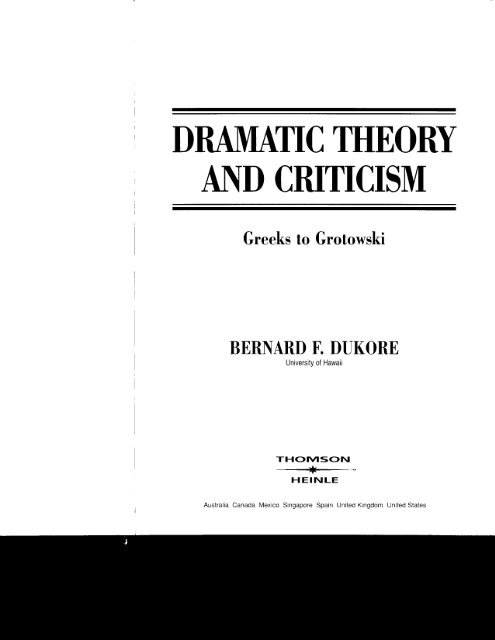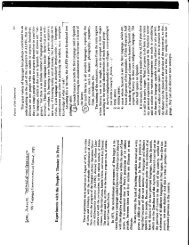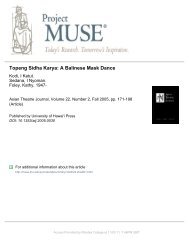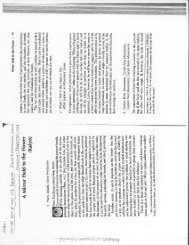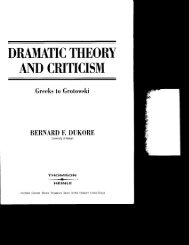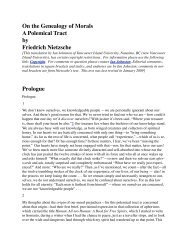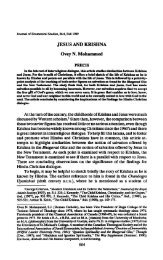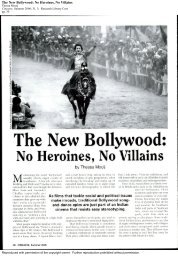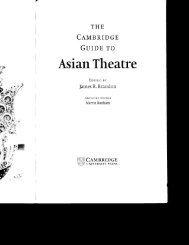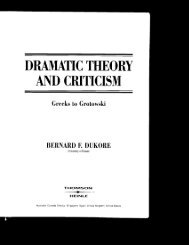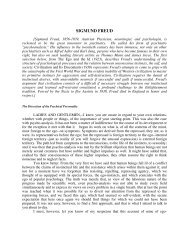Preface to Miss Julie - Yavanika
Preface to Miss Julie - Yavanika
Preface to Miss Julie - Yavanika
You also want an ePaper? Increase the reach of your titles
YUMPU automatically turns print PDFs into web optimized ePapers that Google loves.
DMICTHEORY<br />
ND CRITICISM<br />
Greeks <strong>to</strong> Cro<strong>to</strong>wski<br />
BERI\ARD F. DUKORE<br />
Universitv of Hawaii<br />
THOT\/ISON<br />
+-.-<br />
HEINLE<br />
Australia Canada Mexico Singapore Spain United Kingdom United States
August Strindberg<br />
<strong>Preface</strong> <strong>to</strong><br />
lfil. r I.<br />
rl tlSS f Ulle Idso<br />
rc4s-rstz<br />
Like the arts in general, the theatre has for a long time seemed <strong>to</strong> me a<br />
Biblia Pauperum, a picture Bible for those who cannot read, and the playrvright<br />
merely a lay preacher who hawks the latest ideas in popular fonn,<br />
so popular that the middle classes-the bulk of the audiences-can grasp<br />
thern rvithout racking their brains <strong>to</strong>o much. That explains whv the theatre<br />
has alu'a)'s been an elen-rentary school for voungsters and the half-educated,<br />
and for women, who still retain a primitive capacitv for deceiving themselves<br />
and for letting themselves be deceived, that is, for succurnbing <strong>to</strong> illusions and<br />
responding hy,pnoticallv <strong>to</strong> the suggestions of the author. Consequently, now<br />
that the rudimentarv ancl undeveloped mental processes that operate in ihe<br />
realm of fantasy appear <strong>to</strong> be evolving <strong>to</strong> the level of reflection, research, and<br />
experimentation, I believe that the theatre, like religion, is about <strong>to</strong> be replaced<br />
as a dving institution for u'l.ros enjoyment u'e lack the necessary qualifications.<br />
Support for mv vierv is providcd bv the theatre crisis through rvhich<br />
all of Europe is now passing, and still rnore by the fact that in those highlv<br />
cultured lands u'hich have produced the finest minds of our tirne-England<br />
and Germanr'-the drama is dead, as for the rnost part are the other fine arts.<br />
C)ther countries, horve'"'cr, have thought <strong>to</strong> create a ne\\, drama bv filling<br />
the old forms u'ith nerv contents. But since there has not been enough time<br />
<strong>to</strong> popularize the new ideas, the public cannot understand them. And in the<br />
second place, controversy has so stirred up the public that thev can no longer<br />
look on with a pure and dispassionatc interest, especiallv rvhen the,v see their<br />
rnost cherished ideals assailed or hear an applauding or booing n-rajoritv openl,v<br />
excrcise its tyrannical power, as can happcn in the theatre. And in the third<br />
place, since the new forms for the neu' ideas have not been created, the<br />
nerv vn'ine has burst the old bottles.<br />
In the plav that follou's I have not tried <strong>to</strong> accomplish anything ne\l'-<br />
that is irnpossible. I have or-rlv tried <strong>to</strong> modenrize the form <strong>to</strong> satisy rvhat I<br />
believe up-<strong>to</strong>-date people expect and dernand of this art. And rvith that in<br />
mind I have seized upon-or let mvself be seized bv-a therne r.vhich ma,v be<br />
said <strong>to</strong> lie outside current partl' strife, since the question of being on the<br />
wav up or the n'av dou'n the social ladder, of being on the <strong>to</strong>p or on the<br />
Ii'rorir N{lss lulie by ALrgust Strindberg, translated by Ii. NI. Sprinchorn. San Francisco:<br />
Chandler Publishing Company, 1961. Reprinted b1' pcrmission of Intext Eclucational<br />
Publishers, Scr:rn<strong>to</strong>n, Pennsy'lr'ania. Rcliscd and expandecl for this edition by the trans'<br />
la<strong>to</strong>r, this is thc onlv English translation of Strindberg's coniplete text.<br />
564
t49-1912<br />
' a long time seemed <strong>to</strong> me a<br />
ro cannot read, and the playlatest<br />
ideas in popular forrn,<br />
of the audiences-can grasp<br />
fhat explains wh}, the theatre<br />
ngsters and the half-educated,<br />
racity for deceiving themselves<br />
or succumbing <strong>to</strong> illusions and<br />
he author. Consequently, now<br />
processes that operate in the<br />
rvel of reflection, research, and<br />
566 Nineteenth- andTwenticth-Century Scandinayia<br />
less deep-rooted causes. The specta<strong>to</strong>r, however, generally chooses the one<br />
that puts the least strain on his mind or reflects most credit on his insight.<br />
Consider a case of suicide. "Business failure," says the merchant. "Unhappy<br />
love," say the wornen. "Physical illness," says the sick man. "Lost hopes," says<br />
the down-and-out. But it may be that the reason lav in all of these or in none<br />
of them, and that the suicide hid his real reason behind a completely different<br />
one that rvould reflect greater glorv on his memory.<br />
I have motivated the tragic fate of <strong>Miss</strong> fulie with an abundance of circumstances:<br />
her mother's basic instincts, her father's improper bringing-up<br />
of the girl, her own inborn nature, and her fianci's s\\'av over her weak and<br />
degenerate mind. Further and more immediately: the festive atmosphere of<br />
Midsumner Eve, her father's absence, her rnonthlv illness, her preoccupation<br />
vvith animals, the erotic excitement of the dance, the long summer twilight,<br />
the highly aphrodisiac influence of flowers, and finallv chance itself, which<br />
drives trvo people <strong>to</strong>gether in an out-of-the-wav room. plus the boldness of<br />
the aroused man.<br />
As one can see, I have not concerned mvself solel,v with phvsiological<br />
causes, nor confined mvself monomaniacallr,' <strong>to</strong> psvchological causes, nor<br />
traced evervthing <strong>to</strong> an inheritance from her mother, nor put the blame entirely<br />
on her monthly indisposition or exclusively on "immorality." Nor have<br />
I simplv preached a sermon. Lacking a priest, I have let the cook take care<br />
of that.<br />
I am proud <strong>to</strong> say that this complicated wav of looking at things is in<br />
tune u'ith the times. And if others have anticipated me in this, I am proud<br />
that I am not alone in my paradoxes, as all nerv discoveries are called. And<br />
no one can sav this time that I am being one-sided.<br />
As far as the drau'ing of characters is concerned, I have made the people<br />
in mv play fairly "characterless" for the following rcasons. In the course of<br />
time the word character has acquired manv meanings. Originally it probably<br />
meant the dominant and fundamental trait in the soul complex and was<br />
confused with ternperament. Later the middle class used it <strong>to</strong> mean an<br />
au<strong>to</strong>mation. An individual rvho once for all had found his own true nature<br />
or aclapted himself <strong>to</strong> a certain role in life, rvho in fact had ceased <strong>to</strong> grou',<br />
was called a man of character, r.vhile the man who was constantly developing,<br />
who, like a skillful sailor on the currents of life, did not sail with close-tied<br />
sheets but who fell off before the wind in order <strong>to</strong> lufi again, r,vas called a man<br />
of no character-deroga<strong>to</strong>ril,v of course, since l.re \\,as so difficult <strong>to</strong> keep track<br />
of, <strong>to</strong> pin dou'n and pigeonhole. This middle-class conception of a fixed character<br />
rvas trarrsferred <strong>to</strong> the stage, u'here the midclle class has always ruled. A<br />
character there came <strong>to</strong> rnean soneone who u'as ahvays one and the same,<br />
alu,al's drunk, alwavs joking, always moving, and who needed <strong>to</strong> be characterized<br />
only by some physical defect such as a club foot, a wooden leg, or<br />
a red nose, or by the repetition of some such phrase as, "That's capital," or
,.dinaia<br />
August Strindbery 567<br />
:r, generally chooses the one<br />
ts most credit on his insight.<br />
;ays the merchant. "Unhappy<br />
e sick man. "Lost hopes," says<br />
r Iay in all of these or in none<br />
behind a completely different<br />
rory.<br />
lie with an abundance of cirfather's<br />
improper bringing-up<br />
nc6's sway over her weak and<br />
ly: the festive atmosphere of<br />
thly illness, her preoccupation<br />
ce, the long summer twilight,<br />
d finally chance itself, which<br />
y room, plus the boldness of<br />
'self solely with physiological<br />
<strong>to</strong> psvchological causes, nor<br />
rother, nor put the blame enly<br />
on "immorality." Nor have<br />
I have let the cook take care<br />
'ay of looking at things is in<br />
tated me in this, I am proud<br />
:w discoveries are called. And<br />
ded.<br />
rned, I have made the people<br />
ring reasons. In the course of<br />
:anings. Originally it probably<br />
n the soul con-rplex and was<br />
le class uscd it <strong>to</strong> mean an<br />
rd found his orvn true nature<br />
o in fact had ceased <strong>to</strong> grorv,<br />
ho was constantly developing,<br />
'e, did not sail with close-tied<br />
<strong>to</strong> luft again, was called a man<br />
l was so difficult <strong>to</strong> keep track<br />
;s conception of a fixcd characldle<br />
class has alwavs ruled. A<br />
/as always one ancl the same,<br />
rnd who needed <strong>to</strong> be chara<br />
club foot, a wooden leg, or<br />
rhrase as, "That's capital," or<br />
"Barkis is willin'." This uncomplicated way of viewing people is still <strong>to</strong> be<br />
found in the great Molidre. Harpagon is nothing but a miser, although Harpagon<br />
could have been both a miser and an exceptional financier, a fine father,<br />
and a good citizen. Worse still, his "defect" is extremely advantageous <strong>to</strong><br />
his son-in-law and his daughter who will be his heirs and therefore should not<br />
find fault with him, even if they do have <strong>to</strong> u'ait a while <strong>to</strong> jump in<strong>to</strong> bed<br />
<strong>to</strong>gether. So I do not believe in simple stage characters. And the summary<br />
judgments that writers pass on people-he is stupid, this one is brutal, that<br />
one is jealous, this one is stingy, and so on-should not pass unchallenged by<br />
the naturalists who know horv complicated the soul is and who realize that<br />
vice has a reverse side very much like virtue.<br />
Since the persons in my play are modern characters, living in a transitional<br />
era more hectic and hysterical than the previous one at least, I have<br />
depicted them as more unstable, as <strong>to</strong>rn and divided, a mixture of the old and<br />
the new. Nor does it seem improbable <strong>to</strong> me that modern ideas might also<br />
have seeped down through newspapers and kitchen talk <strong>to</strong> the level of the<br />
servants. Consequently the valet may belch forth from his inherited slave<br />
soul certain modern ideas. And if there are those who find it wrong <strong>to</strong> allow<br />
people in a modern drama <strong>to</strong> talk Darwin and who recommend the practice<br />
of Shakespeare <strong>to</strong> our attention, may I remind thern that the gravedigger in<br />
Hamlet talks the then fashionable philpsophy of Giordano Bruno (Bacon's<br />
philosophy), which is even more improbable, seeing that the means of spreading<br />
ideas were fewer then than now. And besides, the fact of the matter is that<br />
Darwinism has always existed, ever since Moses' his<strong>to</strong>ry of creation from the<br />
lower animals up <strong>to</strong> man, but it u'as not until recently that we discovered it<br />
and formulized it.<br />
My souls-or characters-are conglomerations from various stages of cuJture,<br />
past and present, walking scrapbooks, shreds of human lives, tatters <strong>to</strong>rn<br />
from former fancy dresses that are now old rags-hodgepodges just like the<br />
human soul. I have even supplied a little source his<strong>to</strong>ry in<strong>to</strong> the bargain by<br />
letting the weaker steal and repeat words of the stronger, letting them get<br />
ideas (suggestions as they are called) from one another, from the environment<br />
(the songbird's blood), and from objects (the razor). I have also arranged<br />
for Cedankenilbertragunel through an inanimate medium <strong>to</strong> take place<br />
(the count's boots, the servant's bell). And I have even made use of "waking<br />
suggestion" (a variation of hypnotic suggestion), which have by now been<br />
so popularized that they cannot arouse ridicule or scepticism as they would<br />
have done in Mesmer's time.<br />
I say <strong>Miss</strong> <strong>Julie</strong> is a modern character not because the nran-hating halfwoman<br />
has not always existed but because she has now been brought out in<strong>to</strong><br />
the open, has taken the stage, and is making noises. Victirn of a superstition<br />
1 Teleuathv.
568 Nineteenth- and Twentieth-Century Scandinavia<br />
(one that has seized even stronger minds)- that rvoman' that stunted form of<br />
}ru*"n being, standing *itft ma'n, the lord of creation' the crea<strong>to</strong>r of culture'<br />
is meant <strong>to</strong> be the equal of man or could ever possibly-be'.she involves herselfinanabsurdstrugglewithhiminwhichshefalls.Absurdbecausea<br />
stunted form, subiect #tne laws of propagation' will alwavs be born stunted<br />
andcannevercatchupwiththeone*1.'ohasthelead.Asfollorvs:A(the<br />
n-ran) and B (the *o.i",,; start from-th:-t1-" poin] C' A w]th,a speed of<br />
i"iui ,ry 100 and B with a speed of 60.vhen will Be overtake A? Answer:<br />
never. Neither rvith the help of equal education or equal voting rights-nor<br />
bv universal disarmament and temperance societies-any more than two<br />
oarallel lines can never meet. The half-rvoman is a t1,pe that forces itself on<br />
ffi*" ;iiil;i;J fo, po*"., medats, recognition, diplomas, ".r for*.t]I,]:<br />
sold itself foi money. If represents degeneration. It is not a strong sPecles<br />
for it cloes not rnaintain itself, but uniortunately it propagates its misery in<br />
thefo]lowinggeneration.Degeneratemenunconsciouslvselect-theirmates<br />
iro- "*o.,itil"s" h"lf-."o-Jt" so that thev breed and spread' producing<br />
creatures of indeterminate sex <strong>to</strong> u,hom life ii a <strong>to</strong>rture, but who fortunately<br />
are overcom. .u..t,u"lt,' either by a hostile realitv, o1 by uncontrolled<br />
-the<br />
b.""ki.,g loose of their iepressed instincts, or else b1, their frustration in not<br />
being able <strong>to</strong> compete *iit, tt e male sex. It is a tragic tvpe, oftering us the<br />
speciacle of a desperate fight against nature; a tragic legacy<br />
-of.romanticism<br />
iil"t is now being dissipaied bi naturalism-a movement u'hich seeks onlv<br />
;;i;.;t, and fo"r that strong and healthv species at9.Lesu1ted'.<br />
But <strong>Miss</strong> |ulie is also a vestlge of the old warrior nobilitv that is now being<br />
superseded bv a neu'nobilittlof netve and brain' She is a victirn of the<br />
disorder produced within a farnill' b'v a mother's "crinte"' of the mistakes of<br />
awholegenerationgonewlong'ofci,cumstances,ofher.owndefectivecon.<br />
stitution-all of which put <strong>to</strong>gliher is equivalen<strong>to</strong> the fate or universalaw<br />
of the ancients. The .,Jtur"lii, have banished guilt along with God, but the<br />
.o.tr"qu.n".s of the act-punishment, imprisonment' or the fear of it-cannotbebanishedro,tt'.si*plereasonthatthevrenrainrvhetherornotthe<br />
naturalist dismisses the case irom his court. Those sitting on the sidelines can<br />
easilv afiord <strong>to</strong> be lenient; but what of the injured parties? And even if her<br />
;;,h;t;;."*p"'"a <strong>to</strong> io'go taking his revenge' <strong>Miss</strong> |ulie<br />
take veng"r.r."<br />
o.t herseif, as she dJes in th! play, because of that inherited or ar:-<br />
1vguld<br />
!"ir"a sense of honor that has been transmitted <strong>to</strong> the upper classes fromrvell,<br />
where does it come from? From the "g: o.f barbarism' from the first<br />
Ary"nr, from the chivalry of the l\4iddle Ages' And uery code it was' but<br />
i l":<br />
now inimical <strong>to</strong> the suro.iual of the .ace. Iiis the aris<strong>to</strong>crat's form of hara-kiri'<br />
a law of conscience that bids the fapanese <strong>to</strong> slice his own s<strong>to</strong>mach when someone<br />
else dishonors hirn rn" same^sort of thing surviveq slightly modified, in<br />
that exclusive prerogative of the aris<strong>to</strong>cracv, thJ duel' (Example: the husband<br />
challenges his wife's'lover <strong>to</strong> a duel; the lover shoots the husband and runs off
ndinaia<br />
I rvoman, that stunted form of<br />
:reation, the crea<strong>to</strong>r of culture,<br />
r possibly be, she involves herh<br />
she falls. Absurd because a<br />
rn, will always be born stunted<br />
s the lead. As follorvs: A (the<br />
re point C, A rvith a speed of<br />
n will Be overtake A? Answer:<br />
on or equal voting rights-nor<br />
;ocieties-anv more than two<br />
r is a type that forces itself on<br />
ition, diplomas, as formerly it<br />
on. It is not a strong species<br />
.ely it propagates its misery in<br />
rconsciouslv select their mates<br />
breed and spread, producing<br />
a <strong>to</strong>rture, but who fortunately<br />
'ealitv, or by the uncontrolled<br />
:lse by their frustration in not<br />
; a tragic type, offering us the<br />
r tragic legacy of romanticism<br />
r movement r.vhich seeks only<br />
ecies are required.<br />
rrior nobilitv that is now being<br />
brain. She is a victirn of the<br />
r's "crime," of the mistakes of<br />
ces, of her own defective connt<br />
<strong>to</strong> the fate or universalaw<br />
guilt along with God, but the<br />
nment, or the fear of it-caney<br />
remain rvhether or not the<br />
ose sitting on the sidelines can<br />
iured parties? And even if her<br />
rge, <strong>Miss</strong> fulie would take ven-<br />
:cause of that inherited or ar:-<br />
ed <strong>to</strong> the upper classes frome<br />
of barbarism, from the first<br />
\nd a very fine code it was, bu[<br />
te aris<strong>to</strong>crat's form of hara-kiri,<br />
:e his own s<strong>to</strong>mach when someg<br />
survives, slightly modified, in<br />
: duel. (Example: the husband<br />
roots the husband and runs off<br />
August Strindberg 569<br />
with the wife. Result: the husband has saved his honor but lost his wife.)<br />
Hence the servant fean lives on; but not <strong>Miss</strong> |ulie, r,vho cannot live without<br />
honor. The advantage that the slave has over his master is that he has not<br />
committed himself <strong>to</strong> this defeatist pnnciple. In all of us Aryans there is<br />
enough of the nobleman, or of the Don Quixote, <strong>to</strong> make us sympathize r,vith<br />
the man who takes his oivn life after having dishonored hiniself by shameful<br />
deeds. And we are all of us aris<strong>to</strong>crats enough <strong>to</strong> be distressed at the sight of a<br />
a great man lying like a dead hulk ready for the scrap pile, even, I suppose, if<br />
he were <strong>to</strong> raise hirnself up again and redeern himself by honorable deeds.<br />
The servant fean is the beginning of a new species in which noticeable<br />
differentiation has already taken place. He began as the child of a poor<br />
worker and is norv evolving through self-education in<strong>to</strong> a future gentleman<br />
of the upper classes. He is quick <strong>to</strong> learn, has highly developed senses (smell,<br />
taste, sight), and a keen appreciation of beauty. He l-ras already come up in<br />
the world, for he is strong enough not <strong>to</strong> hesitate <strong>to</strong> n.rake use of other people.<br />
He is already a stranger <strong>to</strong> his old friends, wl.rom he despises as reminders of<br />
past stages in his development, and whom he fears and avoids because they<br />
know his secrets, guess his intentions, look lvith envy on his rise and in joyful<br />
expectation <strong>to</strong>rvard his fall. Hence his character is unformed and divided. He<br />
wavers betrveen an admiration of high positions and a hatred of the men who<br />
occupv them. He is an aris<strong>to</strong>crat-he says so himself-familiar with the ins<br />
and outs of good society. He is polished on the outside, but coarse underneath.<br />
He wears liis frock coat with elegance but gives no assurance that he keeps<br />
his body clean.<br />
He respects <strong>Miss</strong> fulie but he is afraid of Christine, for she knorvs his innermost<br />
secrets. Yet he is sufficiently hard-hearted not <strong>to</strong> let the events of<br />
the night upset his plans for the future. Possessing both the coarseness of<br />
the slave and the <strong>to</strong>ughmindedness of the born ruler, he can look at blood<br />
without fainting, shake off bad luck like water, and take calamity by the<br />
horns. Consequently he will escape from the battle unwounded, probably<br />
ending up as proprie<strong>to</strong>r of a hotel. And if he himself does not get <strong>to</strong> be a<br />
Rumanian count, his son will doubtless go <strong>to</strong> college and possibly end up as<br />
a government official.<br />
Now his observations about life as the lorver classes see it, from below, are<br />
well worth listening <strong>to</strong>-that is, they are whenever he is telling the truth,<br />
which is not <strong>to</strong>o often, because he is more likely <strong>to</strong> say what is advantageous<br />
<strong>to</strong> him than what is true. When <strong>Miss</strong> fulie supposes that everyone in the<br />
lower classes must feel greatly oppressed by the weight of the classes above,<br />
fean naturally agrees with her since he wants <strong>to</strong> win her sympathy. But he<br />
prornptly takes it all back when he finds it advisible <strong>to</strong> separate himself from<br />
the mob.<br />
Apart from the fact that |ean is coming up in the world, he is also superior<br />
<strong>to</strong> <strong>Miss</strong> fulie in that he is a man. In the sexual sphere, he is the
570 N inete e nth- and T w entieth-C entur v- Sc andinayia<br />
aris<strong>to</strong>crat. He has the strength of the male, more highly developed senses,<br />
and the ability <strong>to</strong> take the initiative. His inferiority is merely the result of<br />
his social environment, which is only temporary and which he will probably<br />
slough off along with his livery.<br />
His slave nature expresses itself in his awe of the count (the boots) and<br />
in his religious superstitions. But he is awed by the count mainly because<br />
the Count occupies the place he wants most in life; and this awe is still there<br />
even after he has won tl-re daughter of the house and seen how hollow that<br />
beautiful shell was.<br />
I do not believe that anv love in the "higher" sense can be born from<br />
the union of two such different souls; so I have let <strong>Miss</strong> fulie's love be refashioned<br />
in her imagination as a love that protects and purifies, and I have<br />
let fean imagine that even his love might have a chance <strong>to</strong> grow under other<br />
social circumstances. For I suppose love is very much like the hyacinth that<br />
must strike roots deep in the dark earth before it can produce a vigorous<br />
blossom. Here it shoots up, bursts in<strong>to</strong> bloom, and turns <strong>to</strong> seed ail at once;<br />
and that is why it dies so quicklv.<br />
Christine-finally <strong>to</strong> get <strong>to</strong> her-is a female slave, spineless and phlegrnatic<br />
after years spent at the kitchen s<strong>to</strong>ve, bovinelv unconscious of her own<br />
l.rvpocrisv, and with a full quota of moral and religious notions that serve as<br />
scapegoats and cloaks for her sins-which a stronger soul does not require<br />
since he is able either <strong>to</strong> carry the burden of his own sins or <strong>to</strong> rationalize<br />
them out of existence. She attends church regularll' where she deftly unloads<br />
un<strong>to</strong> |esus-that straw man-her household theffs and picks up irom him<br />
another load of innocence. She is onlv a secondarv character. and I have<br />
deliberateh' done no more than sketch her in-jrrst as I treated the country<br />
doc<strong>to</strong>r and parish priest in The Father where I only wanted <strong>to</strong> draw ordinary<br />
evervdav people such as most country doc<strong>to</strong>rs and parsons are. That some<br />
have found my minor characters one-dimensional is due <strong>to</strong> the fact that<br />
ordinary people while at work are <strong>to</strong> a certain extent one-dimensional and do<br />
lack an independent existence, showing onlv one side of themselves in the<br />
performance of their duties. And as long as the audience does not feel it<br />
needs <strong>to</strong> see them from different angles, mv abstract sketches will pass muster.<br />
Now as far as the dialogue is concerned, I have broken somewhat with<br />
tradition in refusing <strong>to</strong> make my characters in<strong>to</strong> interlocu<strong>to</strong>rs who ask stupid<br />
questions <strong>to</strong> elicit witty answers. I have avoided the symmetrical and mathematical<br />
design of the artfully constructed French dialogue and have let<br />
rninds work as irregularly as they do in real life, where no subject is quite<br />
exhausted before another mind engages at random some cog in the conversation<br />
and governs it for a rvhile. M1' dialogue wanders here and there,<br />
gathers material in the first scenes which is later picked up, repeated, reworked,<br />
developed, and expanded like the theme in a piece of music.<br />
The action of the play poses no problems. Since it really involves only
naia<br />
August Strindberg<br />
>/l<br />
re highly developed senses,<br />
rity is merelv the result of<br />
rnd which he will probably<br />
the Count (the boots) and<br />
the Count mainly because<br />
'e; and this awe is still there<br />
and seen how hollow that<br />
r" sense can be born from<br />
let <strong>Miss</strong> <strong>Julie</strong>'s love be re-<br />
:ts and purifies, and I have<br />
:hance <strong>to</strong> grow under other<br />
ruch like the hyacinih that<br />
it can produce a vigorous<br />
d turns <strong>to</strong> seed all at
572 N ineteenth- and T w entieth-C enturv Sc andinaia<br />
the situation and mood of the plav can probably improvise the monologue<br />
better than the author, who cannot estimate ahead of time how much mav<br />
be said and for how long before the illusion is broken.<br />
Some theatres in Itaiy have, as u'e knou', returned <strong>to</strong> the art of improvisation<br />
and have thereby trained ac<strong>to</strong>rs who are trulv inventive-without, however,<br />
violating the intentions of the author. This seems <strong>to</strong> be a step in the<br />
right direction and possibly the beginning of a new, fertile form of art that<br />
will be genuinely productive.<br />
In place where the monologue cannot be properly motivated, I have resorted<br />
<strong>to</strong> pan<strong>to</strong>mime. Here I have given the ac<strong>to</strong>r even more freedom <strong>to</strong> be<br />
creative and win honor on his ou'n. Nevertheless, not <strong>to</strong> trv the audience bevond<br />
its limits, I have relied on music-u'ell motivated by the Midsummer<br />
Eve dance-<strong>to</strong> exercise its hlpnotic powers during the pan<strong>to</strong>mirne scene. I<br />
beg the music direc<strong>to</strong>r <strong>to</strong> select his tunes rvith great care, so that associations<br />
foreign <strong>to</strong> the mood of the plav will not be produced bv reminders of popular<br />
operettas or current dance numbers or bv folk rnusic of interest only <strong>to</strong><br />
ethnologists.<br />
The ballet that I have introduced cannot be replaced by a so-called crowd<br />
scene. Such scenes are always badly actecl, with a pack of babbling fools taking<br />
advantage of the occasion <strong>to</strong> "gag it up," thereby destroving the illusion. Inasmuch<br />
as country people do not improvise their taunts but make use of<br />
material alreadv <strong>to</strong> hand by giving it a double meaning, I have not ccmposed<br />
an original lampoon but have made use of a little known round dance that I<br />
noted down in the S<strong>to</strong>ckholm district. The rvords do not fit the situation<br />
exactly, which is what I intended, since the slave in I'ris cunning (that is,<br />
lveakness ) never attacks directly. At any rate, let us have no comedians in<br />
this serious s<strong>to</strong>ry and no obscene srnirking over an affair that nails the lid<br />
on a family coffin.<br />
As far as the scenery is concerned, I have borrowed frorn impressionistic<br />
painting the idea of asymmetrical and open conposition, and I believe that<br />
I have thereby gained something in the way of greater illusion. Because the<br />
audience cannot see the r'vhole room and all the furniture, thev will have <strong>to</strong><br />
surmise what's missing; that is, their imagination u'ill be stimuiated <strong>to</strong> fill in<br />
the rest of the picture. I have gained something else by this: I have avoided<br />
those tiresome exits through doors. Stage doors are made of canvas and<br />
rock at the slightest <strong>to</strong>uch. 'fhcv cannot even be used <strong>to</strong> indicate the wrath<br />
of an angry father rvho s<strong>to</strong>rms out of the house after a bad dinner, slarnming<br />
the door behind him "so that the whole house shakes." (In the theatre it<br />
sways and billows.) Furthermore, I have confined the action <strong>to</strong> one set, both<br />
<strong>to</strong> give the characters a chance <strong>to</strong> become part and parcel of their environment<br />
and <strong>to</strong> cut dorvn on scenic extravagance. If there is only one set, one has a<br />
right <strong>to</strong> expect it <strong>to</strong> be as realistic as possible. Yet nothing is more difficult<br />
than <strong>to</strong> make a room look like a room, hou'ever easy it may be for the
dtndyta<br />
August Strindbery 577<br />
bly improvise the monologue<br />
read of time how much mav<br />
broken.<br />
rrned <strong>to</strong> the art of improvisa-<br />
:uly inventive-without, howris<br />
seems <strong>to</strong> be a step in the<br />
new, fertile form of art that<br />
roperly motivated, I have re<strong>to</strong>r<br />
even more freedom <strong>to</strong> be<br />
s, not <strong>to</strong> try the audience berotivated<br />
by the Midsummer<br />
ring the pan<strong>to</strong>min-re scene. I<br />
reat care, so that associations<br />
uced by reminders of popular<br />
k music of interest onl1, <strong>to</strong><br />
replaced by a so-called crowd<br />
pack of babbling fools taking<br />
ry destroving the illusion. In-<br />
-reir taunts but make use of<br />
Leaning, I have not ccmposed<br />
le known round dance that I<br />
lrds do not fit the situation<br />
ave in his cunning (that is,<br />
let us have no comedians in<br />
r an affair that nails the licl<br />
rrrowed from impressionistic<br />
nposition, and I believe that<br />
greater illusion. Because the<br />
: furniture, thel,will have <strong>to</strong><br />
r will be stimulated <strong>to</strong> fill in<br />
else by this: I have avoided<br />
rs are made of canvas and<br />
e used <strong>to</strong> indicate the wrath<br />
rfter a bad dinner, slarnming<br />
: shakes." (In the theatre it<br />
C the action <strong>to</strong> one set, both<br />
il parcel of their environment<br />
:e is only one set, one has a<br />
fet nothing is more difficult<br />
)ver easy it may be for the<br />
scene painter <strong>to</strong> create waterfalls and erupting volcanos. I suppose we shall<br />
have <strong>to</strong> put up with walls made of canvas, but isn't it about time that we<br />
s<strong>to</strong>pped painting shelves and pots and pans on the canvas? There are so<br />
many otl-rer conventions in the theater which we are <strong>to</strong>ld <strong>to</strong> accept in good<br />
faith that we should be spared the strain of believing in painted saucepans.<br />
I have placed the backdrop and the table at an angle <strong>to</strong> force the ac<strong>to</strong>rs<br />
<strong>to</strong> play face <strong>to</strong> face or in half profile when they are seated opposite each other<br />
at the table. In a production of Aida I saw a flat placed at such an angle,<br />
rvhich led the eye out in an unfarniliar perspective. Nor did it look as if it<br />
had been set that u,ay simply <strong>to</strong> be different or <strong>to</strong> avoid those mono<strong>to</strong>nous<br />
right angles.<br />
Another desirable innovation u'ould be the removal of the footlights. I<br />
understand that the purpose of lighting from below is <strong>to</strong> make the ac<strong>to</strong>rs<br />
look more full in the face. But may I ask why all ac<strong>to</strong>rs should have full<br />
faces? Doesn't this kind of lighting wipe out rnanl' of the finer features in<br />
the lorver part of the face, especially around the laws? Doesn't it dis<strong>to</strong>rt the<br />
shape of nose and throrv false shadows above the eyes? If not, it certainly<br />
does something else: it hurts the ac<strong>to</strong>r's eyes. The footlights hit the retina<br />
at an angle fron-r which it is usuallv shielded (except in sailors who must<br />
look at the sunlight reflected in the u,ater), and the result is the loss of any<br />
efiective play' of the eves. All one ever sees on stage are goggle-eyed glances<br />
sidervays at the boxes or upward at the balconv, r,vith only the rvhites of the<br />
eves being visible in the latter case. And this probabiy also accounts for that<br />
tiresome fluttering of the evelashes that the female p.rfor-"r, are particularly<br />
guiltl'of. If an ac<strong>to</strong>r nou'adavs u'ants <strong>to</strong> express something with his eyes, he<br />
can onlv do it looking right at the audience, in rvhich case he makes direct<br />
contact rvith someone outside the proscenium arch-a bad habit known justifiably<br />
or not, as "saving hello <strong>to</strong> friends."2<br />
I should think that the use of sufficiently strong side lights (through the<br />
use of reflec<strong>to</strong>rs or something like them) would provide the ac<strong>to</strong>r with a new<br />
asset: an increased range of expression made possible by the play of the eyes,<br />
the most expressive part of the face.<br />
I have scarcelv anv illusions about getting ac<strong>to</strong>rs <strong>to</strong> play for the audience<br />
and not directly at them, although this should be the goal. Nor do I dream of<br />
ever seeing an ac<strong>to</strong>r pla1, through all of an important scene with his back <strong>to</strong><br />
the audience. But is it <strong>to</strong>o much <strong>to</strong> hope that crucial scenes could be played<br />
where the author indicated and not in front of the prornpter's box as if they<br />
were duets demanding applause? I am not calling for a revolution, only for<br />
some small cl.ranges. I am u,ell aware that transforming the stage in<strong>to</strong> a real<br />
room with the fourth wall missine and with some of the furniture nlaced with<br />
z "Counting the house" would be the equivalent in Arnerican theatre slang ftransla<strong>to</strong>r's<br />
note].
574 Nineteenth- and Twentieth-Century Scandinavia<br />
backs <strong>to</strong> the audi<strong>to</strong>rium would only upset the audience, at least for the<br />
present.<br />
If I bring up the subiect of make-up, it is not because I dare hope <strong>to</strong> be<br />
heeded by ihe'tadles, who would rather be beautiful than truthful. But the<br />
male ac<strong>to</strong>r might do well <strong>to</strong> consider if it is an advantage <strong>to</strong> paint his face<br />
with character lines that remain there like a mask. Let us imagine an ac<strong>to</strong>r<br />
who pencils in with soot a few lines between his eyes <strong>to</strong> indica_te great angel'<br />
and let us suppose that in that permanently enraged state he finds he has <strong>to</strong><br />
smile on " certain line. Imagine the horrible grimace! And how can the old<br />
character ac<strong>to</strong>r wrinkle his brows in anger when his false bald pate is as smooth<br />
as a billiard ball?<br />
In a modern psychological drama, in which every tremor of the soul should<br />
be reflected -or. by facial expressions than by gestures and grunts, it would<br />
probably be most sensible <strong>to</strong> ixperiment with strong side lighting on a small<br />
itage, using ac<strong>to</strong>rs without any make-up or a minimum of it'<br />
And then, if we could get rid of the visible orchestra with its disturbing<br />
lights and the faces turned <strong>to</strong>ward the public; if the audi<strong>to</strong>rium floor could<br />
b! raised so that the specta<strong>to</strong>l's eyes are not level with the ac<strong>to</strong>r's knees; if<br />
we could get rid of ihe proscenium boxes and their occupants, giggling<br />
diners and drinkers; and if we could have it dark in the audi<strong>to</strong>rium during<br />
the performance; and if, above everything else, we could have a small stage<br />
a.rd a., intimate audi<strong>to</strong>rium-then possibly a new drama might arise and at<br />
least one theatre become a refuge for cultured audiences. While we ale waiting<br />
for such a theatre, we shall have <strong>to</strong> write for the dramatic s<strong>to</strong>ckpile and<br />
prepare the reper<strong>to</strong>ry that one day shall come.<br />
^<br />
il.r. is my attempt. If I have failed, there is still time <strong>to</strong> try again!<br />
An Effective PlaY c.reoo<br />
An efiective play should contain or make use of:<br />
Hints and intimations<br />
A secret made known <strong>to</strong> the audience either at the beginning or <strong>to</strong>ward<br />
Translated by Evert Sprinchorn. copyright o 1974 by Evert Sprinchorn. Printed by<br />
oermission of the transla<strong>to</strong>r.


